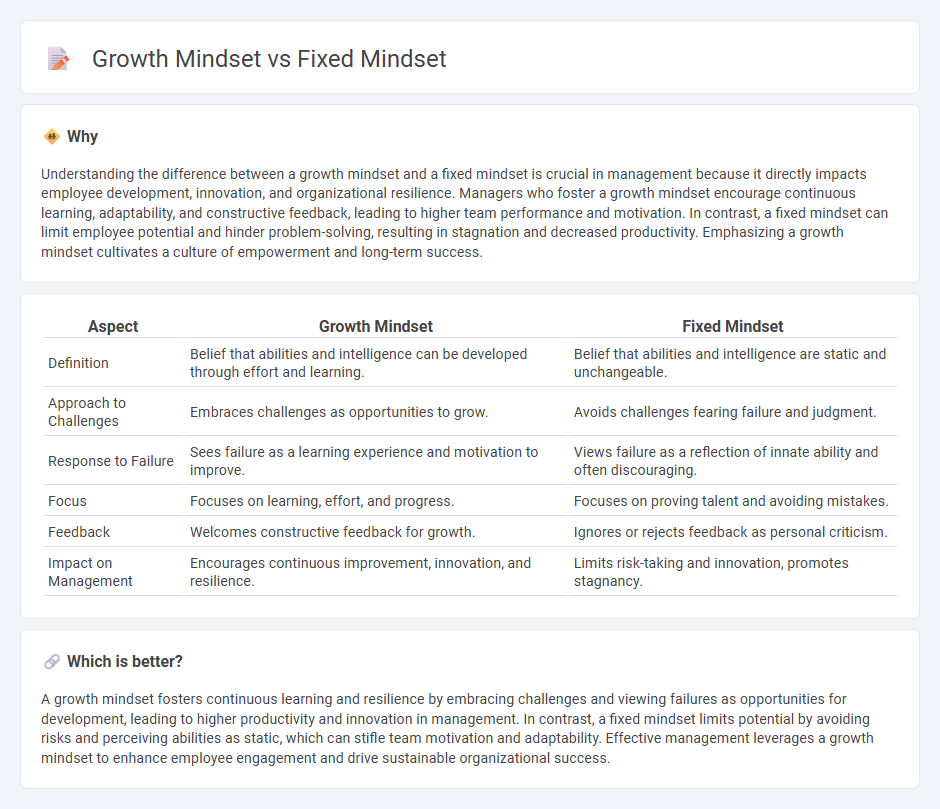
A growth mindset embraces challenges and views failures as opportunities for development, fostering continuous learning and adaptability in management. In contrast, a fixed mindset limits potential by avoiding risks and perceiving abilities as static, hindering innovation and team progress. Explore how adopting a growth mindset can transform leadership effectiveness and organizational success.
Why it is important
Understanding the difference between a growth mindset and a fixed mindset is crucial in management because it directly impacts employee development, innovation, and organizational resilience. Managers who foster a growth mindset encourage continuous learning, adaptability, and constructive feedback, leading to higher team performance and motivation. In contrast, a fixed mindset can limit employee potential and hinder problem-solving, resulting in stagnation and decreased productivity. Emphasizing a growth mindset cultivates a culture of empowerment and long-term success.
Comparison Table
| Aspect | Growth Mindset | Fixed Mindset |
|---|---|---|
| Definition | Belief that abilities and intelligence can be developed through effort and learning. | Belief that abilities and intelligence are static and unchangeable. |
| Approach to Challenges | Embraces challenges as opportunities to grow. | Avoids challenges fearing failure and judgment. |
| Response to Failure | Sees failure as a learning experience and motivation to improve. | Views failure as a reflection of innate ability and often discouraging. |
| Focus | Focuses on learning, effort, and progress. | Focuses on proving talent and avoiding mistakes. |
| Feedback | Welcomes constructive feedback for growth. | Ignores or rejects feedback as personal criticism. |
| Impact on Management | Encourages continuous improvement, innovation, and resilience. | Limits risk-taking and innovation, promotes stagnancy. |
Which is better?
A growth mindset fosters continuous learning and resilience by embracing challenges and viewing failures as opportunities for development, leading to higher productivity and innovation in management. In contrast, a fixed mindset limits potential by avoiding risks and perceiving abilities as static, which can stifle team motivation and adaptability. Effective management leverages a growth mindset to enhance employee engagement and drive sustainable organizational success.
Connection
Growth mindset fosters a belief in the ability to develop skills through effort, while fixed mindset assumes talents are innate and unchangeable, impacting management strategies and employee development. Managers who encourage a growth mindset create environments that promote learning, resilience, and innovation, enhancing overall team performance and adaptability. Understanding the dynamic between these mindsets allows leaders to tailor feedback and motivation techniques that drive continuous improvement and organizational success.
Key Terms
Beliefs
A fixed mindset centers on the belief that intelligence and abilities are innate and unchangeable, leading individuals to avoid challenges and fear failure. In contrast, a growth mindset embraces the understanding that skills can be developed through effort, learning, and perseverance, fostering resilience and a love for learning. Explore deeper insights on how these core beliefs impact personal development and success.
Learning
A fixed mindset limits learning by believing abilities are innate and unchangeable, while a growth mindset embraces challenges and views effort as a path to mastery. Neuroscientific studies reveal that brain plasticity supports growth through continuous learning and adaptation. Explore effective strategies to cultivate a growth mindset and enhance your learning potential.
Adaptability
A fixed mindset limits adaptability by perceiving abilities as static, preventing individuals from embracing change or learning from challenges. In contrast, a growth mindset fosters adaptability through viewing skills as developable, encouraging continuous learning and resilience in dynamic environments. Discover how cultivating a growth mindset can enhance your adaptability and success.
Source and External Links
Fixed Mindset Definition and Meaning - A fixed mindset describes individuals who believe their qualities, such as intelligence and talent, are innate and unchangeable, often leading to avoidance of challenges to maintain self-image.
Growth Mindset Vs. Fixed Mindset - The fixed mindset involves believing that one's abilities are fixed at birth and cannot be improved, leading to fear of failure and avoidance of challenges.
Carol Dweck: A Summary of Growth and Fixed Mindsets - A fixed mindset is characterized by a belief that one's inherent traits determine success, discouraging effort and the pursuit of growth opportunities.
 dowidth.com
dowidth.com